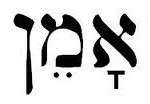Amen – Ask the Rabbi
 Q. Why do we say Amen after certain prayers?
Q. Why do we say Amen after certain prayers?
A. From one point of view, saying Amen shows that we care.
When you hear a statement of fact or opinion and are concerned enough to say Amen, you are not indifferent or apathetic.
You know there are some things which are right and some which are wrong, and you have the courage to endorse the right thing even when it makes you unpopular.
The liturgical rules insist that Amen is said clearly, not too early and not too late.
Amen creates a connection between the officiant and the congregation, who are duty bound to respond with Amen when they hear a blessing.
The general rule is that one does not say Amen after one’s own b’rachah. There are two exceptions, one after boneh b’rachamav Yerushalayim in the Grace After Meals, and the other at the end of the b’rachah prior to the Shema when one is praying privately.
In the latter case, one says E-l Melech Ne’eman (“God, Faithful King”), the initial letters of which make up Amen.
The liturgical use of Amen is found in the Torah, though in Temple times the pious response was Baruch Shem K’vodo L’olam Va’ed or one of its variants and it appears that Amen only came into its own in the synagogue.
See also: Let us say Amen



